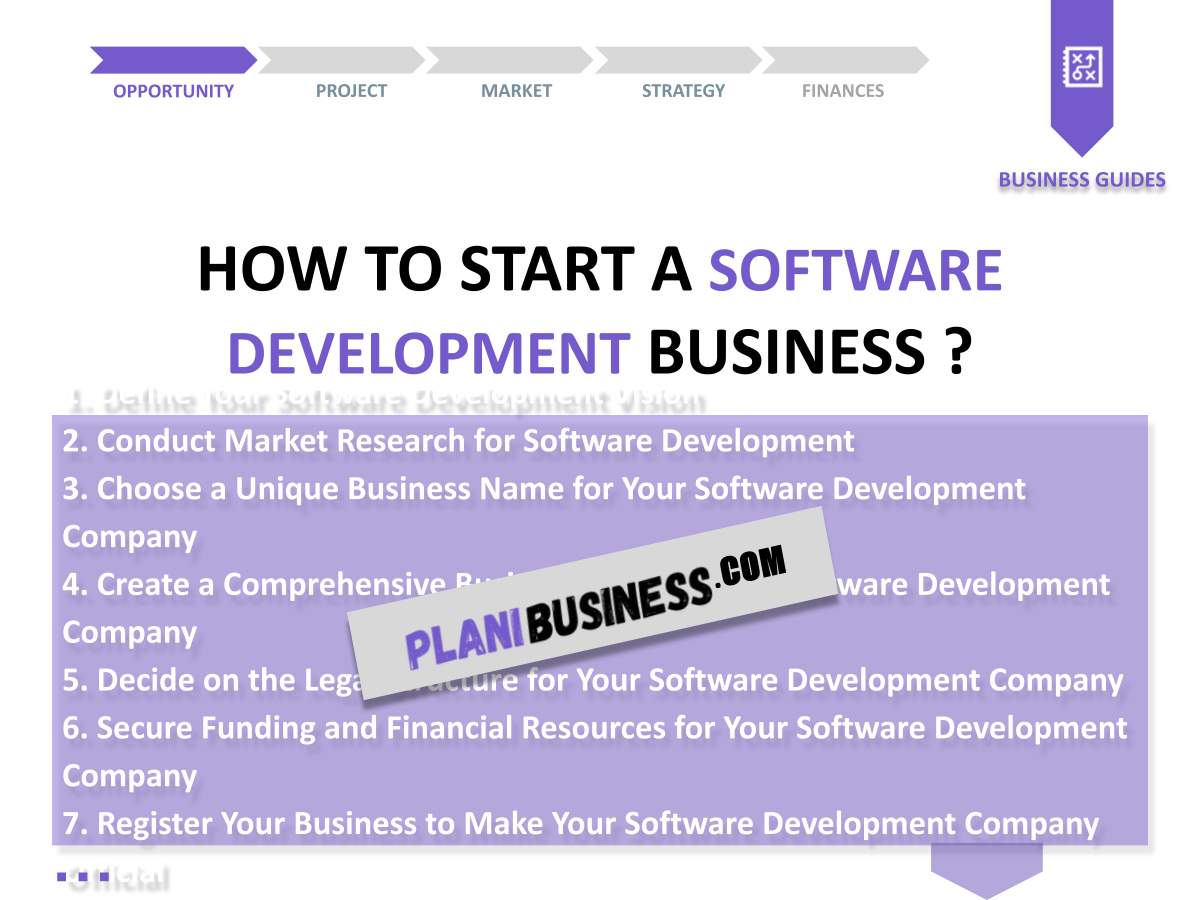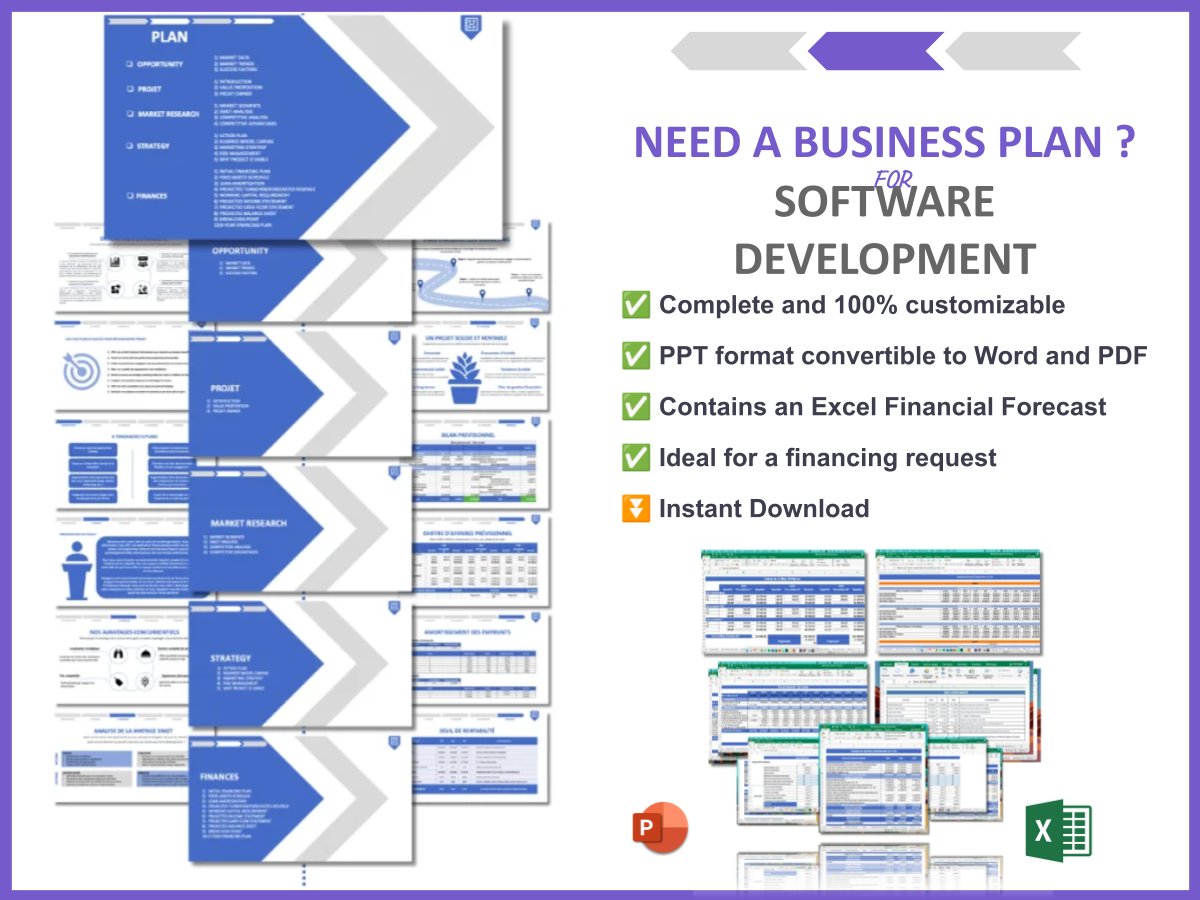Are you considering how to start a software development company? You’re not alone! Many aspiring entrepreneurs are drawn to this dynamic field, driven by the potential for innovation and profitability. Did you know that the global software market is projected to reach over $1 trillion in the coming years? This staggering figure highlights the immense opportunities that await those ready to dive in. In this article, we’ll explore the essential steps for launching your very own software development business, providing you with practical advice and insights.
Here’s a brief overview of what we’ll cover:
– Defining your software development vision
– Conducting thorough market research
– Choosing a unique business name
– Creating a comprehensive business plan
– Deciding on a legal structure
– Securing funding and financial resources
– Registering your business
– Obtaining necessary licenses and permits
– Setting up financial management systems
– Establishing your brand identity
– Developing a professional website
– Marketing and advertising strategies
– Assembling your team
1. Define Your Software Development Vision
When you’re starting out, the first step is to define your software development vision. Ask yourself what problems you want to solve or what needs you want to meet. This vision will guide your decisions and help you stay focused as you build your business.
- Identify Your Passion: Think about the areas of software development that excite you the most. Is it mobile apps, web development, or perhaps enterprise solutions?
- Set Clear Goals: Establish short-term and long-term goals for your company. This could be anything from developing a flagship product to acquiring a certain number of clients.
- Visualize Success: Picture what success looks like for your software development company. This could include financial milestones, team growth, or market impact.
Having a well-defined vision not only motivates you but also attracts potential investors and clients who resonate with your goals. Remember, clarity is key!
2. Conduct Market Research for Software Development
Next, you need to conduct market research for software development. Understanding your target market is crucial for making informed decisions and minimizing risks. Here’s how to get started:
- Identify Your Target Audience: Who will benefit from your software? Consider demographics, preferences, and pain points. Create customer personas to visualize your ideal clients.
- Analyze Competitors: Research existing players in the software development field. What services do they offer? What are their strengths and weaknesses? This analysis will help you identify gaps in the market.
- Assess Market Trends: Stay updated on industry trends and technological advancements. For instance, trends like artificial intelligence and cloud computing are reshaping the software landscape.
To make your research more effective, consider using a table to summarize your findings:
| Competitor | Strengths | Weaknesses | Opportunities |
|---|---|---|---|
| Competitor A | Established brand, diverse services | High pricing | Expand into emerging markets |
| Competitor B | Strong customer support | Narrow service range | Opportunity for service diversification |
By conducting thorough market research, you’ll gain valuable insights that will inform your business strategy and help you position your software development company for success.
3. Choose a Unique Business Name for Your Software Development Company
Choosing a unique business name is a critical step in establishing your brand identity. Your name should resonate with your target audience and reflect the essence of your software development services. Here are some tips to help you brainstorm:
- Keep It Simple: A short, memorable name is easier for clients to remember and recommend.
- Reflect Your Services: Consider including words related to software, technology, or development to make your business focus clear.
- Check Availability: Before settling on a name, ensure the domain name is available and check for trademarks to avoid legal issues.
For instance, names like “CodeCrafters” or “TechInnovate” suggest a focus on software development while being catchy and easy to remember. Once you have a few options, test them with potential customers or colleagues to gauge their reactions.
4. Create a Comprehensive Business Plan for Your Software Development Company
A well-structured business plan is essential for guiding your startup. It serves as a roadmap for your business and is often required if you’re seeking funding. Here’s how to create a comprehensive business plan:
- Executive Summary: Summarize your vision, mission, and the services you’ll offer. This section should capture the essence of your software development company.
- Market Analysis: Include insights from your market research. Describe your target audience, competitors, and market trends.
- Marketing Strategy: Outline how you plan to attract and retain clients. Include your branding, pricing, and promotional strategies.
- Operational Plan: Detail the day-to-day operations, including team structure, development processes, and project management tools.
- Financial Projections: Provide realistic forecasts for revenues, expenses, and profits. This will be crucial for potential investors.
To streamline the process, I recommend checking out this business plan template for Software Development. It’s super detailed and can save you a ton of time!
Creating a comprehensive business plan not only helps you clarify your ideas but also demonstrates your commitment to your software development company. Remember, this document can evolve as your business grows, so keep it updated!
5. Decide on the Legal Structure for Your Software Development Company
Choosing the right legal structure for your software development company is crucial as it affects taxes, liability, and your operational flexibility. Here are the common options you can consider:
- Sole Proprietorship: This is the simplest structure, where you own the business entirely. However, it comes with unlimited personal liability.
- Limited Liability Company (LLC): An LLC provides personal liability protection while allowing flexibility in management and tax treatment.
- Corporation: This structure offers the most protection from personal liability but requires more paperwork and regulations. It can be beneficial for raising capital.
Consider consulting with a legal expert to evaluate which structure aligns best with your goals and the nature of your software development business. They can help you navigate the complexities and ensure compliance with local laws.
6. Secure Funding and Financial Resources for Your Software Development Company
Securing adequate funding is a vital step in ensuring your software development company has the resources to grow. Here’s how to approach funding:
- Self-Funding: If you have savings, consider using them to kickstart your business. This option gives you full control without owing anyone.
- Angel Investors: These individuals invest their personal funds in startups. In return, they often seek equity in your company. Prepare a solid pitch to attract their interest.
- Venture Capital: If you plan to scale quickly, venture capital firms can provide significant funding in exchange for equity. They typically look for high-growth potential.
To help visualize your funding sources and their implications, here’s a simple table outlining potential funding options:
| Funding Source | Advantages | Disadvantages |
|---|---|---|
| Self-Funding | No debt, full control | Risk of personal loss |
| Angel Investors | Access to mentorship, networking | Equity dilution |
| Venture Capital | Large amounts of capital | High expectations for growth |
Regardless of the funding route you choose, make sure to create a detailed financial plan to manage expenses and track your cash flow effectively. This foresight will be crucial for the sustainability of your software development company.
7. Register Your Business to Make Your Software Development Company Official
Once you’ve decided on a business name and legal structure, the next step is to register your business. This process legitimizes your software development company and allows you to operate legally. Here’s how to go about it:
- Choose Your Business Name: Ensure that the name you’ve chosen is not already in use. You can usually check this through your local business registry.
- File the Necessary Paperwork: Depending on your legal structure, you’ll need to file different forms. For an LLC, this may include Articles of Organization; for a corporation, you’ll need to file Articles of Incorporation.
- Obtain an EIN: Apply for an Employer Identification Number (EIN) from the IRS. This number is crucial for tax purposes and will be required for opening a business bank account.
It’s advisable to keep copies of all registration documents and any correspondence with government agencies. This organization will help you maintain compliance as your software development company grows.
8. Obtain Necessary Tax Identification Numbers, Licenses, and Permits for Your Software Development Company
Before you can start operating your software development company, you must obtain the necessary tax identification numbers, licenses, and permits. Here’s what you need to consider:
- Tax Identification Numbers: In addition to your EIN, you may need state tax IDs depending on your location. This is important for handling state taxes.
- Business Licenses: Research what licenses are required for software development in your area. Some states or municipalities may have specific regulations.
- Industry-Specific Permits: If your software development services involve sensitive data or specific industries (like healthcare), you may need additional permits to comply with regulations.
To keep track of your requirements, consider creating a checklist of all necessary licenses and permits. This proactive approach will help you avoid any legal issues down the road.
By ensuring that you have all the necessary documentation and permits, you position your software development company for a smooth start, allowing you to focus on delivering exceptional services to your clients.
9. Set Up Financial Management Systems for Your Software Development Company
Establishing a solid financial management system is crucial for the success of your software development company. It helps you track income, expenses, and overall financial health. Here are some key steps to consider:
- Choose Accounting Software: Select software that fits your needs. Popular options like QuickBooks, FreshBooks, or Xero can help you manage your finances efficiently.
- Set Up a Business Bank Account: Keep your personal and business finances separate by opening a dedicated business bank account. This simplifies tracking and tax preparation.
- Establish a Budget: Create a budget that outlines your expected income and expenses. This will help you make informed financial decisions and plan for growth.
To visualize your financial goals, consider creating a simple table to outline your projected income and expenses:
| Item | Projected Income | Projected Expenses |
|---|---|---|
| Client Projects | $100,000 | $60,000 |
| Software Licenses | N/A | $5,000 |
| Marketing Costs | N/A | $10,000 |
Regularly reviewing your financial management system will allow you to adjust your strategies as needed and ensure the sustainability of your software development company.
10. Establish Your Brand Identity for Your Software Development Company
Your brand identity is how your software development company is perceived by clients and the market. A strong brand helps you stand out and attract customers. Here are some essential elements to consider:
- Create a Memorable Logo: Your logo is often the first impression potential clients have of your business. Invest in a professional design that reflects your brand’s personality.
- Choose Brand Colors and Fonts: Select colors and fonts that resonate with your target audience and convey the right message. Consistency in these elements builds recognition.
- Develop a Unique Selling Proposition (USP): Identify what sets your software development services apart from the competition. This could be your innovative approach, exceptional customer service, or specialized expertise.
To ensure consistency, create a brand style guide that outlines how your brand elements should be used across different platforms and marketing materials. This guide will help maintain a cohesive identity as your software development company grows.
By investing time in establishing a strong brand identity, you not only enhance your visibility but also build trust with potential clients, making it easier for them to choose your software development services.
11. Develop a Professional Website for Your Software Development Company
Your website is your digital storefront and plays a crucial role in attracting clients. A well-designed website showcases your expertise and services. Here are key elements to include:
- User-Friendly Design: Ensure your website is easy to navigate. A clean layout with intuitive menus helps visitors find information quickly.
- Showcase Your Portfolio: Highlight successful projects to demonstrate your skills. Include case studies or testimonials from satisfied clients to build credibility.
- Optimize for SEO: Use relevant keywords throughout your site to improve visibility on search engines. This includes optimizing page titles, meta descriptions, and content.
To visualize the essential pages for your website, consider this simple table outlining key sections:
| Page | Purpose |
|---|---|
| Home | Overview of services and unique selling proposition |
| About Us | Background, mission, and team introduction |
| Services | Detailed descriptions of services offered |
| Portfolio | Showcase of past projects and client testimonials |
| Contact | Methods for potential clients to reach out |
Investing in a professional website not only enhances your online presence but also builds trust with potential clients, making them more likely to choose your software development company.
12. Market and Advertise Your Software Development Company
Once your website is live, it’s time to market and advertise your software development company. Effective marketing strategies will help you reach potential clients and establish your brand in the industry. Here are some strategies to consider:
- Content Marketing: Create valuable content such as blogs, whitepapers, or videos that showcase your expertise. This positions you as an authority in the software development field.
- Social Media Marketing: Utilize platforms like LinkedIn, Twitter, and Facebook to engage with your audience and share updates about your services. Regularly post content that resonates with your target market.
- Email Marketing: Build an email list to keep potential clients informed about your services, industry trends, and special offers. Personalize your messages to increase engagement.
To track the effectiveness of your marketing efforts, consider creating a table to monitor key performance indicators (KPIs):
| Marketing Channel | KPI | Target |
|---|---|---|
| Content Marketing | Website Traffic | Increase by 30% in 6 months |
| Social Media | Engagement Rate | Achieve 5% engagement |
| Email Marketing | Open Rate | Reach 20% open rate |
By actively marketing your software development company, you’ll attract more clients and create opportunities for growth.
13. Assemble Your Team for Your Software Development Company
The success of your software development company largely depends on the quality of your team. Assembling the right talent is crucial. Here’s how to approach building your team:
- Identify Key Roles: Determine the essential roles you need to fill, such as developers, designers, project managers, and marketers. Each position should align with your company’s goals.
- Recruit Talented Individuals: Use job boards, networking events, and social media to find candidates. Look for individuals who not only have the right skills but also fit your company culture.
- Foster a Collaborative Environment: Encourage teamwork and open communication among your team members. A positive work environment leads to higher productivity and job satisfaction.
To help visualize your team structure, consider this simple table outlining potential roles:
| Role | Responsibilities |
|---|---|
| Software Developer | Design and implement software solutions |
| UI/UX Designer | Create user-friendly interfaces and experiences |
| Project Manager | Oversee project timelines and deliverables |
| Marketing Specialist | Develop and execute marketing strategies |
Building a skilled and cohesive team will not only enhance your software development company’s capabilities but also contribute to its long-term success. By investing in your team, you set the foundation for innovation and excellence in your services.
Conclusion
Starting a software development company is an exciting and rewarding journey. By following the steps outlined in this guide, you can lay a solid foundation for your business and position yourself for success in the competitive tech landscape. Remember to define your vision, conduct thorough market research, and build a talented team to help you achieve your goals.
As you continue your entrepreneurial journey, I encourage you to explore further resources that can enhance your knowledge and skills. Check out our articles on how to create a SWOT Analysis for Software Development and How to Kickstart a Software Development Marketing Plan? With Example. These resources will provide you with valuable insights to navigate the challenges of the software development industry.
With determination and the right strategies, your software development company can thrive in this ever-evolving field. Embrace the journey, and best of luck!
Frequently Asked Questions (FAQ)
- What are the first steps to start a software development company?
The first steps include defining your vision, conducting market research, and creating a business plan. You should also decide on a legal structure and secure funding.
- How do I choose a niche for my software development business?
Identify your interests and expertise, analyze market trends, and assess competition. Look for gaps in the market that your skills can fill.
- What legal requirements do I need to consider?
Legal requirements vary by location but typically include registering your business, obtaining an EIN, and securing necessary licenses and permits.
- How can I effectively market my software development services?
Utilize content marketing, social media, and email campaigns to reach potential clients. Showcase your expertise through blogs and case studies.
- What should be included in a software development business plan?
A business plan should include an executive summary, market analysis, marketing strategy, operational plan, and financial projections.
- How do I determine pricing for my software development services?
Research competitors, consider your costs, and assess the value you provide to clients. You may also explore different pricing models, such as hourly rates or project-based fees.
- What tools and technologies should I use for software development?
Popular tools include integrated development environments (IDEs) like Visual Studio Code, project management tools like Jira, and collaboration platforms like Slack.
- How can I ensure the quality of my software products?
Implement quality assurance practices, conduct thorough testing, and gather user feedback. Continuous improvement is key to delivering high-quality software.
- What are the common challenges in starting a software development company?
Challenges may include competition, managing finances, and keeping up with technology trends. Having a solid business plan and adaptable strategies can help you navigate these hurdles.
- How do I build a strong team for my software development company?
Identify key roles, recruit talented individuals, and foster a collaborative environment. Invest in team development and maintain open communication.







